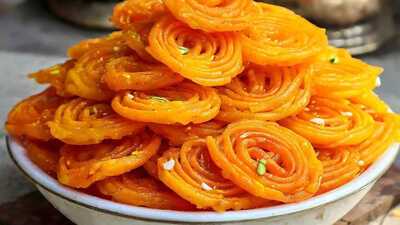That evening plate of papad, a handful of bhujia during tea, or a crispy samosa with chutney, these little indulgences often feel harmless. For many of us, they’re not just snacks but part of our everyday routine. But what if the foods we enjoy most are silently contributing to major health risks like diabetes, heart disease, obesity, and even cancer? What seems like a harmless munch can slowly build up into something far more dangerous for our bodies.
Video
5 Indian foods that can cause diabetes, heart disease, and obesity
Papad

Papad is a staple on many Indian dining tables, but according to Agarwal, it’s one of the worst foods for your health. High in sodium and often fried, papad can raise blood pressure levels and put extra strain on your heart.
Over time, frequent consumption can increase the risk of hypertension and cardiovascular disease.
Bhujia
That crunchy bhujia packet may seem like the perfect tea-time snack, but it’s loaded with oil, refined flour, and salt.
Regular consumption not only promotes weight gain and cholesterol imbalance but also increases the risk of diabetes due to high glycaemic content.
Jalebi

Jalebi is pure indulgence, deep-fried and drenched in sugar syrup. The high sugar and trans-fat content make it a direct culprit for obesity, insulin resistance, and type 2 diabetes.
Eating it often can also contribute to fatty liver disease.
Samosa
Golden, crispy samosas are hard to resist, but their refined flour crust and deep-frying make them a dangerous choice for the heart.
Loaded with starch and unhealthy fats, samosas increase the risk of obesity, digestive issues, and cardiovascular disease if consumed frequently.
Supari (betel nut)

Supari may be a common chew after meals, but it’s far from safe. Nutritionists warn that betel nut has carcinogenic properties and is strongly linked to oral cancer and gum diseases.
Regular chewing also affects digestion and raises the risk of metabolic issues.
In short, while enjoying these foods occasionally may not be harmful, frequent consumption increases the risk of long-term health problems.
Nutritionists like Suman Agarwal stress that making mindful choices today can prevent serious lifestyle diseases tomorrow.
Also read| Eating too many guavas can be harmful for kidney and gut health; know safe ways to include them in your diet
https://www.instagram.com/reel/DMFQqt_MIIb/ https://www.instagram.com/reel/DMFQqt_MIIb/
On the July 11 episode of The Masoom Minawala Show, nutritionist Suman Agarwal broke down five everyday Indian foods that we should think twice before adding to our diet. Her take was clear: these snacks may taste good, but their long-term impact on health is far from sweet. From fried favourites to addictive munchies, Agarwal explained why these common items could be setting us up for lifestyle diseases, and why moderation is the key to protecting our health.Video
5 Indian foods that can cause diabetes, heart disease, and obesity
Papad
Papad is a staple on many Indian dining tables, but according to Agarwal, it’s one of the worst foods for your health. High in sodium and often fried, papad can raise blood pressure levels and put extra strain on your heart.
Over time, frequent consumption can increase the risk of hypertension and cardiovascular disease.
Bhujia
That crunchy bhujia packet may seem like the perfect tea-time snack, but it’s loaded with oil, refined flour, and salt.
Regular consumption not only promotes weight gain and cholesterol imbalance but also increases the risk of diabetes due to high glycaemic content.
Jalebi
Jalebi is pure indulgence, deep-fried and drenched in sugar syrup. The high sugar and trans-fat content make it a direct culprit for obesity, insulin resistance, and type 2 diabetes.
Eating it often can also contribute to fatty liver disease.
Samosa
Golden, crispy samosas are hard to resist, but their refined flour crust and deep-frying make them a dangerous choice for the heart.
Loaded with starch and unhealthy fats, samosas increase the risk of obesity, digestive issues, and cardiovascular disease if consumed frequently.
Supari (betel nut)

Supari may be a common chew after meals, but it’s far from safe. Nutritionists warn that betel nut has carcinogenic properties and is strongly linked to oral cancer and gum diseases.
Regular chewing also affects digestion and raises the risk of metabolic issues.
In short, while enjoying these foods occasionally may not be harmful, frequent consumption increases the risk of long-term health problems.
Nutritionists like Suman Agarwal stress that making mindful choices today can prevent serious lifestyle diseases tomorrow.
Also read| Eating too many guavas can be harmful for kidney and gut health; know safe ways to include them in your diet
You may also like

Patriot Games: How Gavin Newsom out-trumped Trump - by selling Bibles

US President Donald Trump spotted with hand makeup again and swollen ankles, raising public concern over his chronic venous insufficiency condition

Belgium tightens family reunification rules; raises income and age requirements

Ufff Yeh Siyapaa: Dark comedy will be shown without dialogues, trailer of Nusrat Bharucha's 'Uff Yeh Siyapaa' released..

OpenAI Launches Groundbreaking AI Initiative for Educators in India






